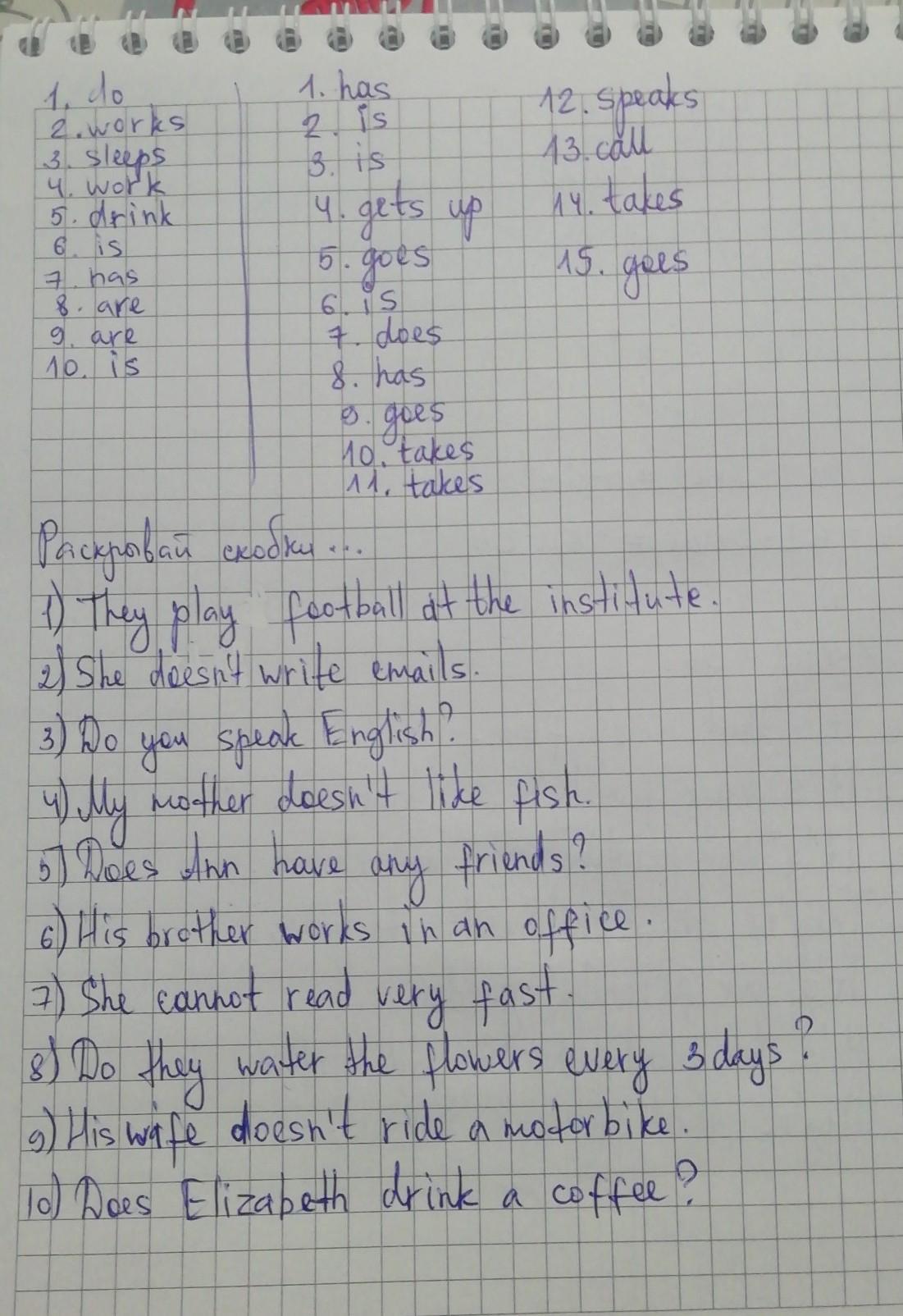. I (to do) morning exercises.
2. He (to work) at a factory.
3. She (to sleep) after dinner.
4. We (to work) part-time.
5. They (to drink) tea every day.
6. Mike (to be) a student.
7. Helen (to have) a car.
8. You (to be) a good friend.
9. You (to be) good friends.
10. It (to be) difficult to remember everything.
1. Alice (to have) a sister.
2. Her sister’s name (to be) Ann.
3. Ann (to be) a student.
4. She (to get) up at seven o'clock.
5. She (to go) to the institute in the morning.
6. Jane (to be) fond of sports.
7. She (to do) her morning exercises every day.
8. For breakfast she (to have) two eggs, a sandwich and a cup of tea.
9. After breakfast she (to go) to the institute.
10. Sometimes she (to take) a bus.
11. It (to take) her an hour and a half to do her homework.
12. She (to speak) English well.
13. Her friends usually (to call) her at about 8 o’clock.
14. Ann (to take) a shower before going to bed.
15. She (to go) to bed at 11 p. m.
Раскрывай скобки, употребив Past Simple правильно, составь отрицательные и вопросительные предложения
1) They _____ football at the institute. (to play)
2) She _____ emails. (not / to write)
3) ____ you____ English? (to speak)
4) My mother ____ fish. (not / to like)
5) ____ Ann ____ any friends? (to have)
6) His brother _____ in an office. (to work)
7) She ___ very fast. (cannot / to read)
8) ____ they ____ the flowers every 3 days? (to water)
9) His wife _____ a motorbike. (not / to ride)
10) ____ Elizabeth_____ coffee? (to drink)Здесь правильно раскрой скобки и составь предложения
1. I ... a student.
2. My father ... not a shop-assistant, he ... a scientist.
3. ... your aunt a nurse? - Yes, she ... .
4. ... they at home? - No, they ... not. They ... at school.
5. ... you an engineer? - Yes, I....
6. ... your friend a photographer? No, she ... not a photographer, she ... a student.
7. ... your brothers at school? - Yes, they ... .
8. ... this her watch? - Yes, it ... .
9. Max ... an office-worker.
10. We ... late, sorry! Правильно используй глагол to be
1. Она была занята. (to be busy)
2. Я не был занят.
3. Вы были заняты?
4. Они были дома? (to be at home)
5. Его не было дома.
6. Я не знал.
7. Они знали?
8. Она не знала.
9. Кто знал?
10. Никто не знал.
11. Он читал английские книги? (to read English books)
12. Они никогда не читали. (never / to read)
13. У неё была квартира? (to have a flat)
14. У него ничего не было.
15. Кто это был?
Переведи на английский
Ответы
Объяснение:
Пока пиши, я следующее начну
1. I'm a student.
2. My father is not a shop-assistant, he is a scientist.
3. Is you aunt a nurse? - Yes, she is.
4. Are they at home? - No, they aren't. The are at school.
5. Are you an engineer? - Yes, I am.
6. Is your friend a photographer? - No, she isn't a photographer, she is a student.
7. Are your brothers at school? - Yes, they are.
8. Is this her watch? - Yes, it is.
9. Max is an office-worker.
10. We are late, sorry!
Перевод
1. She was busy.
2. I wasn't busy.
3. Were you busy?
4. Were they at home?
5. He wasn't at home.
6. I didn't know.
7. Did they know?
8. She didn't know.
9. Who knew?
10. Nobody knew.
11. Did he read English books?
12. They never read.
13. Had she a flat?
14. He had nothing.
15. Who was it?
